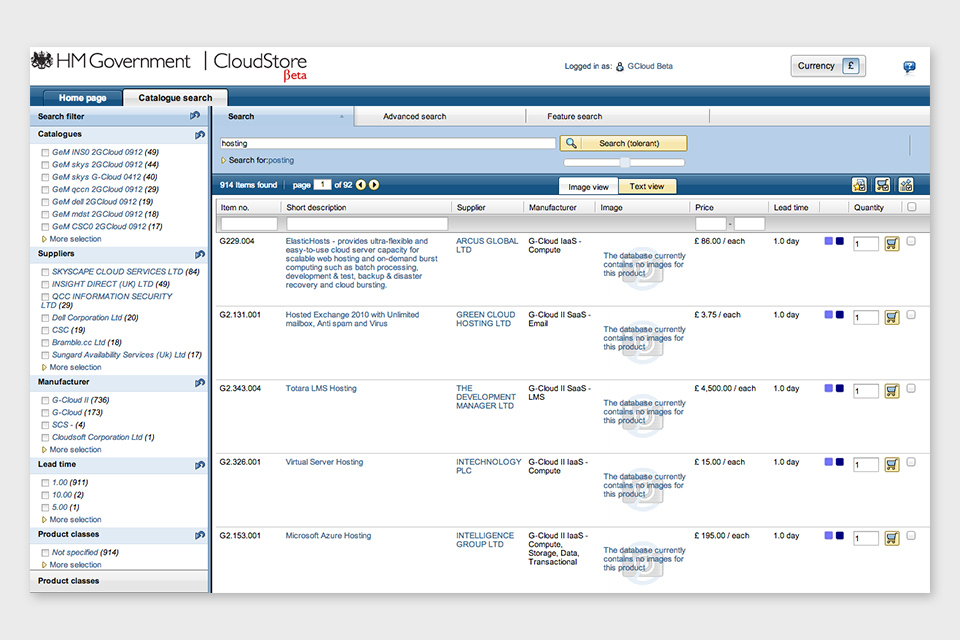Action 10 case study: offering leaner and more lightweight tendering
Published 24 March 2014
A small business view and the CloudStore project
Tim Brooks (BMJ Group) and Denise McDonagh (Home Office) talk about how SMEs can revolutionise digital delivery
Success isn’t easy, says Tim Brooks, a member of the government’s Digital Advisory Board.
I don’t think it’s magic. Success comes from a lot of hard work and argument and pain along the way.
Now the Chief Executive of BMJ Group, Tim has spent his whole life working in the media business. He’s seen digital technologies undermine, then completely revolutionise the way media products are created, sold, and distributed. He’s had first-hand experience of the hard work and the pain found on the path to success.
He’s particularly keen to see government opening its doors to small and medium sized companies, allowing them to supply services that, to date, have been the sole domain of huge technology corporations with huge budgets.
Big doesn’t necessarily mean being best. In the past, says Tim, it’s been almost impossible for anyone other than those big companies to deal with government. In today’s climate, that’s a disadvantage for everyone.
The reality is that it’s often the smaller companies, companies with just 20 people or so, who are driving change and being innovative. They’re inventing new services and taking costs out of services.
If the government can tap into that pool of innovation and ideas, the whole nation will benefit.
It will unleash a lot of creativity. Often the way to solve these problems quickly and effectively is to find small ways to solve them.
The Government Digital Strategy is necessary, he says, because governments in recent years simply haven’t kept up with the speed at which technology changes.
Government has got way behind the rest of the country. It’s a cliché, but it’s true: you can book a flight in two minutes on your mobile phone, but dealing with government often requires lots of paperwork. It’s time government services caught up.
Tim Brooks is Chief Executive of BMJ Group.
Traditionally, government buys IT services from very large suppliers (known as system integrators, or SIs), often under long-term contracts costing many millions of pounds, via a slow and cumbersome procurement process. The Minister for the Cabinet Office, Francis Maude, said in a speech in November 2012:
We know we’re not getting value for money - recently a big SI and an SME bid on the CloudStore for hosting. The SI bid £4 million. The SME bid £50,000.
Traditional procurement practices have to be swept aside, says Denise McDonagh, Director of Home Office IT Strategy and Programme Director for G-Cloud and the online CloudStore.
CloudStore is a radically different approach for buying government IT. It’s a quick, easy and low-cost way for public sector organisations to get the IT services they need, when they need them. Denise says:
The pace of technological change is much faster than it used to be. We have to be able to keep up with it.
One aim is to make it possible for a much wider variety of small and medium-sized companies to supply IT services to government and the wider pubic sector, so they can compete against the big names that have done it in the past. CloudStore removes barriers that made it hard for those smaller businesses to compete. Denise says:
CloudStore is one of the first programmes to let small companies do business with the public sector in a way that’s not too costly for them. It widens the marketplace.
CloudStore sticks to the rules of traditional procurement, and meets all the requirements of national and EU legislation. But it does so in a new and innovative way. So all a public sector buyer needs to do is search on what they want and then buy it. It’s simple, legal and efficient.

Cloudstore beta.
The result is an online store of services, priced up and ready to go. A sort of technology supermarket that Denise compares to an app store you might find on your mobile phone.
It’s a complete transformation, says Denise. “Now we have access to services that are easy to use and easy to turn off when we no longer need them. And they can be as cheap as chips.”
For example, in 2012 the Home Office needed a text messaging service for the duration of the Olympic Games.
If I’d gone to an SI for that, it would have cost me a fortune. But in the end I paid less than £5,000, bought it in a couple of days, deployed it very quickly, and switched it off just like that at the end.
This is a different way of thinking. It’s about challenging the status quo.
Denise McDonagh is the Home Office IT Director and Programme Director for G-Cloud and CloudStore.
